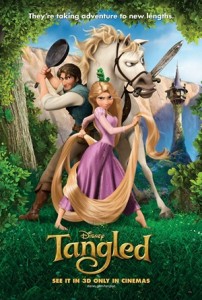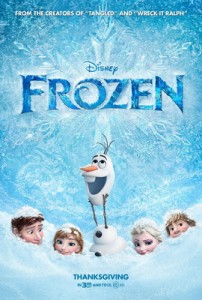Music and Frozen values
This week, my last full week of holiday before pushing my nose firmly against the grindstone once again, I seem to have spent a great deal of time watching Disney films. Whilst my brain refuses to retain specific dates of compositions, Bach Verzeichnis numbers, or a whole host of other tit-bits of information which might actually be useful in my day-to-day working life, it seems to have a terrifying sponge-like quality when it comes to Disney. (Just ask the people I was watching Beauty and the Beast with yesterday – I haven’t seen it since around 2001 and could still do pretty much every song, including spoken interjections, verbatim. I am very grateful to them for not beating me repeatedly over the head and ejecting me from their property.)

© Walt Disney Pictures
So I’ve revisited some old favourites, including the very sweet Oliver and Company (1988, featuring the vocal talents of Billy Joel), and also watched a couple more recent films for the first time. Among the new views was Tangled, a stupendously witty take on the Rapunzel story, made in 2010. I was seriously impressed with this – good music, really funny, all the multi-level references you can expect from sophisticated children’s films, and a sufficiently enlightened update on the damsel-in-distress routine. I was so impressed, in fact, that I went onto Facebook not long after finishing it to bounce enthusiastically about how much I had enjoyed it. And among the various responses from friends, one in particular stuck out. ‘We love Tangled!’, she wrote. (I should explain that she has children and therefore a rather more legitimate reason to have watched it than me.) And she went on: ‘I actually (whisper it) think it’s better than Frozen.’

© Walt Disney Pictures
Now, you’d be an oblivious soul indeed not to have at least heard of Frozen (2013), even if you haven’t put yourself through watching it. I’ve seen it, because I’m a nerdy Disney completist, and was also curious to see the film behind the extraordinary hype. And it’s… fine. It’s ok? I mean, the story has some very charming and unusual elements to it, which have variously been interpreted as innovative, outrageous, or based on Christian allegory. There’s even been a whole study day dedicated to it, a so-called “Symfrozium“. Personally I think it’s overrated, and whilst ‘Let it go’ is catchy, it’s also not terribly well integrated into the plot. But what do I know? Frozen has won 78 awards, including Oscars, Baftas and Golden Globes, and made hundreds and hundreds of millions of dollars. Tangled won just 8 awards, and didn’t make as much money. I’d still rather watch Tangled.
My friend’s humorous implication that one shouldn’t be seen to rate Tangled above Frozen (presumably this is particularly important when there are actual small people present) got me thinking. It got me thinking about how often, in classical music, we feel we should speak positively of a particular work, or composer, or performer, because everyone else does. Because to claim that (whisper it) Beethoven doesn’t move you as much as Hummel, or Wagner leaves you kind of cold, is somehow to betray the system of values that have been enshrined by others, and thus demonstrate yourself to be a philistine. Why aren’t I allowed to like Tangled more than Frozen? Well, because not only the box office, that monitor of commercial success, but also the awards committees, which are supposed to be the arbiters of artistic value, have considered Frozen to be better. Why can’t I say that, given the choice, I’d rather not have to see La Bohème ever again? Because it’s supposed to be one of the greatest operas ever written, and both commercial success and critical studies support the notion that the work should hold that rank, that it’s worth must remain inviolate and unquestioned.
Unfortunately, this doesn’t change the fact that I find almost all of the characters in La Bohème so intensely annoying that I would rather not pay money for a ticket to sit in the theatre with it, even though I greatly admire the music. I find the male protagonists unconvincing and unfocussed, and I’m not sold on the balance of dramatic material between acts. In other words, I can articulate reasons for not liking it. You don’t have to agree, of course. But I can defend my opinion. In considerably more detail than this, if you really want me to…
The danger comes when the defence of ‘the greats’ comes without any articulation of why something is great. If you find yourself being blustered at for daring to voice a dislike of a Schubert Lied, or a Shostakovich String Quartet, then ask the person blustering at you just what their reason is for rating that music so highly. They should be able to tell you. If they can’t – if they are simply parroting that it’s a Great Masterpiece because that’s what they’ve picked up from others, then they don’t really have much right to bluster at you, do they? (Such individuals are occasionally found hiding amongst the friendly audience members in concert halls, so watch out during interval discussion.) I suspect that, like most major phenomena, the success of Frozen was due as much to its cultural and historical circumstances as to its content – the same thing has been argued about the importance of some of Beethoven’s major works. In each case it’s possible to outline the technical aspects of the work, and also its broader context. Both are crucial for a particular level of success, and their relative weighting is liable to be in flux depending upon the situation. Which is why there’s no guaranteed way to make a phenomenon of this kind occur.
We are entitled to like and dislike as we see fit; but it’s best of all, and most interesting and informative, when we can explain our reasons for it, including consideration of broader questions like attitudes and cultural norms of a given time and place. That allows discussion, debate, and an acceptance of varied perspectives, rather than a rigid notion of what is bad and good, based on unquestioning assumptions or conditions which are set in stone (or, indeed, ice) – that way leads to passive-aggressive sniping and divisive notions of cultural worth. So for all of you out there who insist on telling everyone that Frozen is the best Disney film ever, or that Mozart’s ‘Jupiter’ Symphony is a towering masterpiece, but can’t explain why beyond ‘because it just is: everyone thinks so’? Let it go, guys. Come back to me when you can explain why you love or loathe a thing more than any other. That’s a conversation really worth having.

